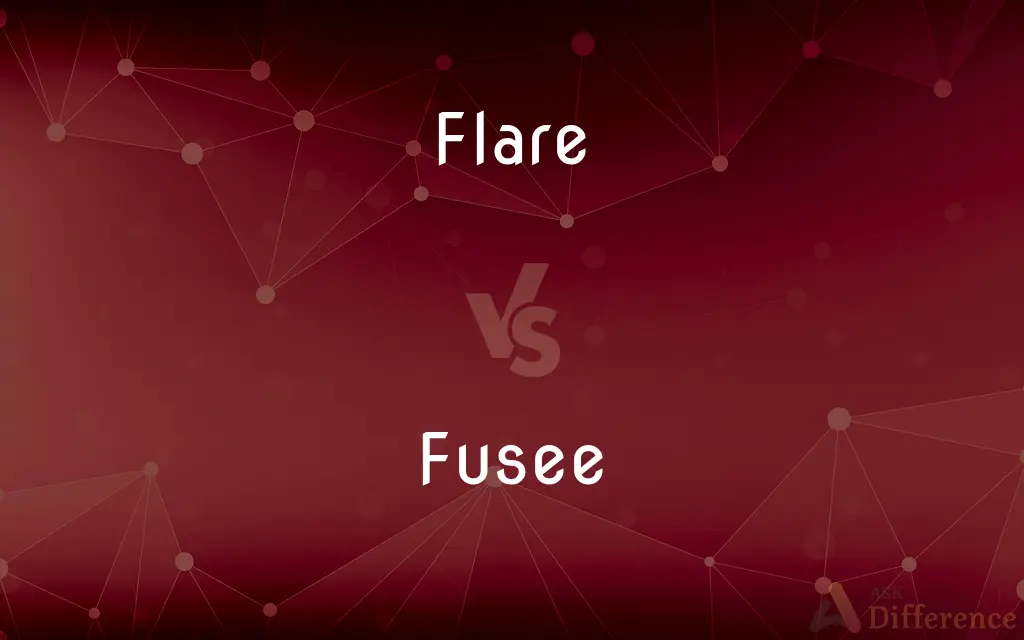Flare vs. Fusee — What's the Difference?
Edited by Tayyaba Rehman — By Urooj Arif — Updated on April 7, 2024
Flare is a device emitting bright light for signaling or illumination, while a fusee is a large, red, flare-like device used for warnings, especially on roads.

Difference Between Flare and Fusee
Table of Contents
ADVERTISEMENT
Key Differences
A flare, often used in emergency situations, emits a bright light or intense heat without an explosion, serving as a signal or to illuminate an area. On the other hand, a fusee, which also serves signaling purposes, is specifically designed to burn with a bright, red light, commonly used for road warnings and by railroads to signal trains.
Flares are typically used in maritime and aviation emergencies to indicate distress and mark locations, utilizing bright light visible from great distances. Whereas fusees are favored in road safety and railway signaling due to their long burn time and distinct red light, making them ideal for drawing attention to hazards.
The composition of flares usually includes pyrotechnic substances that ignite to produce a bright, glaring light, often white or green, to ensure visibility. Fusees, in contrast, contain a slow-burning compound that emits a consistent red glow, specifically chosen for its visibility at night and symbolic association with caution.
Flares can be found in various forms, including handheld, ground, and aerial types, each designed for specific scenarios, from search and rescue to military applications. Fusees, however, are typically stick-like and are designed to be placed on the ground or held, making them more specialized and less versatile than flares.
Despite their differences, both flares and fusees are crucial safety tools. Flares are essential for broad applications requiring immediate visibility, while fusees are indispensable for specific signaling needs, especially in traffic control and railway operations.
ADVERTISEMENT
Comparison Chart
Primary Use
Signaling distress, illumination
Warning, signaling in road and rail contexts
Light Color
Varies (often white, green)
Red
Burn Time
Varies widely, some designed for short, intense use
Typically long-burning
Composition
Pyrotechnic substances for bright light
Slow-burning compound for consistent glow
Application
Maritime, aviation, military, emergency response
Road safety, railway signaling
Compare with Definitions
Flare
A device that produces a bright light for signaling or illumination.
The pilot activated a flare to signal their distress location.
Fusee
A tool or device used for signaling in emergencies or hazardous situations.
During the blackout, they used a fusee to guide vehicles safely.
Flare
An increase in intensity or brightness.
The flare of the fire was visible from miles away.
Fusee
A large flare used for signaling, especially in road and railway safety.
The road crew set up a fusee to warn of the upcoming construction zone.
Flare
A sudden burst of light or heat.
The flare of the match illuminated the dark room momentarily.
Fusee
A part of a match, specifically the ignition component.
The fusee of the match ensures a consistent burn.
Flare
A sudden outburst of emotion.
There was a flare of anger in his eyes.
Fusee
A term sometimes used to refer to a flare in general, especially in specific contexts.
He lit a fusee to signal the end of the event.
Flare
An expansion or spreading outwards.
The skirt has a subtle flare at the hem.
Fusee
A device used in the past to maintain a constant speed in clocks and watches.
The antique clock's mechanism includes a fusee to regulate its movement.
Flare
To flame up with a bright, wavering light.
Fusee
A large-headed match capable of staying alight in strong wind.
Flare
A flare, also sometimes called a fusée, is a type of pyrotechnic that produces a bright light or intense heat without an explosion. Flares are used for distress signaling, illumination, or defensive countermeasures in civilian and military applications.
Fusee
A railway signal flare.
Flare
To erupt or intensify suddenly
Tempers flared at the meeting. His allergies flared up.
Fusee
A conical pulley or wheel, especially in a watch or clock.
Flare
To burst into intense, sudden flame.
Fusee
A usually cone-shaped pulley with a spiral groove, used in a cord- or chain-winding clock to maintain even travel in the timekeeping mechanism as the force of the mainspring lessens in unwinding.
Flare
To become suddenly angry. Used with up
He flared up when she alluded to his financial difficulties.
Fusee
A colored flare used as a warning signal for trucks and railroad trains.
Flare
To make a sudden angry verbal attack. Used with out
Flared out at his accusers.
Fusee
A match with a large head capable of burning in a wind.
Flare
To expand or open outward in shape
A skirt that flares from the waist.
Nostrils that flared with anger.
Fusee
A combustible fuse for detonating explosives.
Flare
To cause to flame up.
Fusee
A light musket or firelock.
Flare
To signal with a blaze of light.
Fusee
A conical, grooved pulley in early clocks, antique watches, and possibly all non-electronic marine chronometers.
Flare
A brief wavering blaze of light.
Fusee
A large friction match.
Flare
A device that produces a bright light for signaling, illumination, or identification.
Fusee
A fuse for an explosive.
Flare
An outbreak, as of emotion or activity.
Fusee
(US) A colored flare used as a warning on the railroad.
Flare
An expanding or opening outward.
Fusee
One who, or that which, fuses or is fused; an individual component of a fusion.
Flare
An unwanted reflection within an optical system or the resultant fogging of the image.
Fusee
A flintlock gun. See 2d Fusil.
Flare
A solar flare.
Fusee
A friction match for smokers' use having a bulbous head which when ignited is not easily blown out even in a gale of wind.
Flare
(Football) A short pass to a back running toward the sideline.
Fusee
A signal device, usually cylindrical, consisting of a tube filled with a composition which burns with a bright colored light for a definite time. It is used principally for the protection of trains or road vehicles, indicating an obstruction or accident ahead. Also called a flare or railroad flare.
Flare
(Baseball) A fly ball hit a short distance into the outfield.
Fusee
The track of a buck.
Flare
An area of redness on the skin surrounding the primary site of infection or irritation.
Fusee
The cone or conical wheel of a watch or clock, designed to equalize the power of the mainspring by having the chain from the barrel which contains the spring wind in a spiral groove on the surface of the cone in such a manner that the diameter of the cone at the point where the chain acts may correspond with the degree of tension of the spring.
Flare
A sudden worsening of the symptoms of a disease or condition
Treating an arthritis flare.
Fusee
A spirally grooved spindle in a clock that counteracts the diminishing power of the uncoiling mainspring
Flare
A sudden bright light.
Fusee
A colored flare used as a warning signal by trucks and trains
Flare
A source of brightly burning light or intense heat.
Solar flare
Fusee
A friction match with a large head that will stay alight in the wind
Flare
A type of pyrotechnic that produces a brilliant light without an explosion, used to attract attention in an emergency, to illuminate an area, or as a decoy.
Flares were used to steer the traffic away from the accident.
The flares attracted the heat-seeking missiles.
Fusee
Any igniter that is used to initiate the burning of a propellant
Flare
(oil industry) A flame produced by a burn-off of waste gas (flare gas) from a flare tower (or flare stack), typically at an oil refinery.
Flare
(figuratively) A sudden eruption or outbreak; a flare-up.
Flare
A widening of an object with an otherwise roughly constant width.
During assembly of a flare tube fitting, a flare nut is used to secure the flared tubing’s tapered end to the also tapered fitting, producing a pressure-resistant, leak-tight seal.
That's a genuine early 70's flare on those pants.
Flare
(nautical) The increase in width of most ship hulls with increasing height above the waterline.
Flare
(in plural) Bell-bottom trousers.
Flare
(aviation) The transition from downward flight to level flight just before landing.
The captain executed the flare perfectly, and we lightly touched down.
Flare
(baseball) A low fly ball that is hit in the region between the infielders and the outfielders.
Jones hits a little flare to left that falls for a single.
Flare
(American football) A route run by the running back, releasing toward the sideline and then slightly arcing upfield looking for a short pass.
Flare
(photography) lens flare
Flare
An inflammation such as of tendons (tendonitis) or joints (osteoarthritis).
Flare
A breakdance move of someone helicoptering his torso on alternating arms.
Flare
(transitive) To cause to burn; in particular, to burn off excess gas (flare gas).
Flare
(transitive) To cause inflammation; to inflame.
Flare
(ambitransitive) To open outward in shape.
The cat flared its nostrils while sniffing at the air. (transitive)
The cat’s nostrils flared when it sniffed at the air. (intransitive)
The building flared from the third through the seventh floors to occupy the airspace over the entrance plaza. (intransitive)
The sides of a bowl flare. (intransitive)
Flare
To (operate an aircraft to) transition from downward flight to level flight just before landing.
Flare
(intransitive) To blaze brightly.
The blast furnace flared in the night.
Flare
(intransitive) To shine out with a sudden and unsteady light; to emit a dazzling or painfully bright light.
The candle flared in a sudden draught.
Flare
To shine out with gaudy colours; to be offensively bright or showy.
Flare
To suddenly happen or intensify.
Flare up
Flare
To suddenly erupt in anger.
Flare up
Flare
To be exposed to too much light.
Flare
To burn with an unsteady or waving flame; as, the candle flares.
Flare
To shine out with a sudden and unsteady light; to emit a dazzling or painfully bright light.
Flare
To shine out with gaudy colors; to flaunt; to be offensively bright or showy.
With ribbons pendant, flaring about her head.
Flare
To be exposed to too much light.
Flaring in sunshine all the day.
Flare
To open or spread outwards; to project beyond the perpendicular; as, the sides of a bowl flare; the bows of a ship flare.
Flare
An unsteady, broad, offensive light.
Flare
A spreading outward; as, the flare of a fireplace.
Flare
A defect in a photographic objective such that an image of the stop, or diaphragm, appears as a fogged spot in the center of the developed negative.
Flare
Leaf of lard.
Flare
A shape that spreads outward;
The skirt had a wide flare
Flare
A sudden burst of flame
Flare
A burst of light used to communicate or illuminate
Flare
Reddening of the skin spreading outward from a focus of infection or irritation
Flare
A sudden recurrence or worsening of symptoms;
A colitis flare
Infection can cause a lupus flare
Flare
A sudden eruption of intense high-energy radiation from the sun's surface; associated with sunspots and radio interference
Flare
Am unwanted reflection in an optical system (or the fogging of an image that is caused by such a reflection)
Flare
A sudden outburst of emotion;
She felt a flare of delight
She could not control her flare of rage
Flare
A device that produces a bright light for warning or illumination or identification
Flare
A short forward pass to a back who is running toward the sidelines;
He threw a flare to the fullback who was tackled for a loss
Flare
(baseball) a fly ball hit a short distance into the outfield
Flare
Burn brightly;
Every star seemed to flare with new intensity
Flare
Become flared and widen, usually at one end;
The bellbottom pants flare out
Flare
Shine with a sudden light;
The night sky flared with the massive bombardment
Flare
Erupt or intensify suddenly;
Unrest erupted in the country
Tempers flared at the meeting
The crowd irrupted into a burst of patriotism
Common Curiosities
Where are fusees commonly used?
On roads and railways for warnings and signaling.
How long can a flare burn?
The burn time varies but can range from a few minutes to an hour, depending on the type.
Can flares be used during the day?
Yes, but their visibility is significantly reduced compared to nighttime use.
Why are fusees red?
Red is universally recognized for warnings and hazards, making it ideal for such purposes.
What is the main purpose of a flare?
To emit a bright light or intense heat for signaling distress or for illumination.
Are flares visible from the air?
Yes, making them useful for signaling to aircraft in emergencies.
Do fusees emit smoke?
Yes, they produce smoke as they burn, which can also aid in signaling.
What materials are used in flares?
They contain pyrotechnic substances that ignite to produce light or heat.
Are fusees used in aviation?
Rarely, as their application is more suited to ground-based signaling.
Can civilians use flares and fusees?
Yes, but their use is regulated, especially for flares due to safety concerns.
Can flares be used underwater?
Some flares are designed for underwater use, particularly for diving emergencies.
How should fusees be stored?
In a dry, secure place, away from heat sources and flammable materials.
What is the difference in light color between flares and fusees?
Flares can emit various colors, while fusees primarily emit red light.
How do you safely dispose of expired flares and fusees?
They should be disposed of according to local regulations, often at hazardous waste facilities.
Are there different types of flares?
Yes, including handheld, ground, and aerial flares, each designed for specific uses.
Share Your Discovery

Previous Comparison
Mandarine vs. Mandarin
Next Comparison
Column vs. PedestalAuthor Spotlight
Written by
Urooj ArifUrooj is a skilled content writer at Ask Difference, known for her exceptional ability to simplify complex topics into engaging and informative content. With a passion for research and a flair for clear, concise writing, she consistently delivers articles that resonate with our diverse audience.
Edited by
Tayyaba RehmanTayyaba Rehman is a distinguished writer, currently serving as a primary contributor to askdifference.com. As a researcher in semantics and etymology, Tayyaba's passion for the complexity of languages and their distinctions has found a perfect home on the platform. Tayyaba delves into the intricacies of language, distinguishing between commonly confused words and phrases, thereby providing clarity for readers worldwide.
















































